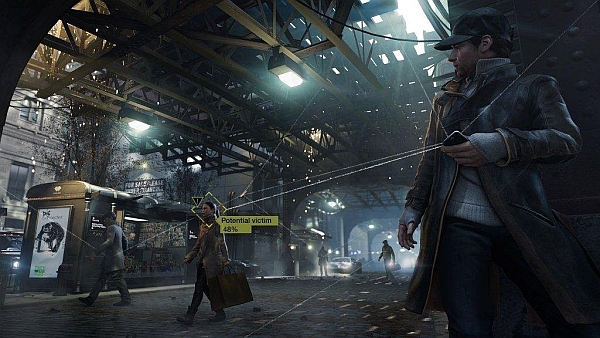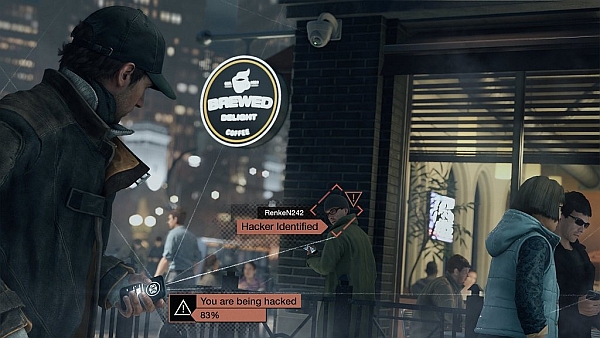
Watch Dogs was unveiled in 2012 at Ubisoft’s E3 Press Conference to the adoration of the entire industry. Over the past year, the Internet hype machine went into full effect, fueled by Ubisoft themselves and the fervor of online commenting communities. After that initial reveal, conjecture naturally sprung up around the web. Would the game look that good? Would the open world really be that open? With Ubisoft sending out trailer after trailer, Watch Dogs was labelled as a coming-of-age party for the next generation in terms of graphics and gameplay.
But the hype train is a bad one to catch, and it has not helped Watch Dogs, making it feel far less than it should be after the initial reveal. After experiencing much of the game’s content, what you end up with is a title that is actually still quite fun to play, but oddly uncompelling.
Platforms: PC, PS3 (Version Played), PS4 (Version Played), Xbox 360, Xbox One
Publisher: Ubisoft
Developer: Ubisoft Montreal
Genre: Open World Hack’em Up
Release Date: May 27, 2014
ESRB Rating: Mature
In Watch Dogs, you play as one-man judge, jury, and executioner Aiden Pearce. A highly skilled hacker and thief, Aiden decides to screw over the wrong people, leading to the accidental death of his niece Lena. Then, as if to make a gruff, angry protagonist even gruffer and angrier, his sister and nephew get kidnapped. Aiden then sets out on a mission of vengeance using ctOS – Chicago’s interconnected computer system – to find his family’s assailants and take down the corrupt dealings going on around the city.
There is something amiss about Ubisoft’s latest open-world game. It’s a complicated mixture of small inconsistencies in the design, the plot, and the game world itself. On top of that, the tone bounces between serious, comical, and nonsensical on an alarmingly regular basis. Once you get rolling after the opening, Aiden seems to switch his focus from one bad guy to the next every mission, which makes none of the antagonists ever feel truly evil. The story meanders from plot point to plot point, never finding a sense of direction or narrative purpose. Rather than a complete package, the Watch Dogs story feels like multiple movies randomly spliced together.
If story isn’t the hook that pulls you in, the hacking will pick up the slack. The simple-to-use mechanic is the main differentiator between Watch Dogs and other open-world titles and, for the most part, it works. A single button on your controller gives you context-sensitive access to all your ctOS-controlling needs. During different in-game sequences, you can point your cursor and tap your Hack button to kill, maim, or distract your enemy. You can do anything from triggering car alarms, to raising bridges, to causing entire city blocks to plunge into darkness. Discovering and using these abilities is very fun, but I quickly found myself in a slump using the same few abilities over and over. This isn’t a testament to the quality of the hacking mechanics, but a reflection on the other mechanics that make up the moment-to-moment gameplay.
Despite being mostly pitched as a next-generation change in gameplay mechanics, Watch Dogs is simply just another third-person cover-based shooter. Aiden ducks into cover with the X button, while L2 aims, and R2 shoots. Even with the hacking options available to you, it’s still easier to jump from cover to cover taking out bad guys with one of a few dozen weapons. Watch Dogs seems to want to give you a sense of variety by letting you hack or shoot your way through an area, but the developers don’t push you towards the hacking. However, this is not the case while driving.

When in a chase sequence, the player is forced to use their ctOS hacking skills. You can be a fantastic driver – slipping between oncoming cars, hitting and landing crazy jumps, and stealthily sneaking down alleyways – but you will never ditch your pursuers. The game funnels you towards bridges, barricades, or exploding underground steam pipes to wreck your opponent’s vehicles, allowing you to then use your driving skills to evade while the remaining bad guys search. That is exactly what I am after. If you are pushing your game on a singular gimmick, then push that gimmick; don’t rest on your laurels just in case some players may not like it. However, it’s a shame that the driving is mostly terrible. While motorbikes seem to hit warp speeds, every other car is either super fast or super slow, and are all as indestructible as one another. Worse still is the fact that none of the cars feels like they have any grip on the road; it’s like every surface in Chicago is covered in ice.
Despite my moaning, much of the gameplay is OK. It has its annoyances, but otherwise, it’s an unremarkable, yet perfectly serviceable game. It’s much of the wrapping around the gameplay that causes Watch Dogs to flounder.
As part of the hacking spirit Watch Dogs has, the game gives you access to something called “The Profiler”. Tapping your Hack button not only allows you to see interactive devices in the environment, but also allows you to take note of small pieces of info about every NPC in Chicago. This allows you to further hack them to see and/or hear their chats and phone calls, or steal money from their bank accounts. This is one of the most excellent parts of Watch Dogs – along with a side mission that lets you become a cyber-voyeur looking through people’s webcams. “The Profiler” adds a much-needed sense of character to the faceless drones milling around the city streets, even making you feel rather bad after accidentally killing them. However, it also adds to the title’s weirdness. As Aiden is a vigilante, you have the ability to profile potential criminals and then take them out before they commit a crime. It’s great, giving you a sense of moral high ground, until you realize that you hacked six bank accounts while tailing your suspect, stealing $3,000 total from a 50-year-old divorcee, three cancer patients, a single mother, and man who frequently searches for strange pornography online. It makes the tone of the game just wonky.
Regardless of how good the moment-to-moment gameplay is, when the game bounces from goofy to serious, things are going to feel strange. Watch Dogs tries to add a weight of character to everyone in the world with “The Profiler”, but mere minutes later you can be climbing up the walls of buildings, and crushing police cars in a six-legged spider tank. First, Aiden will be attempting to be “just” while questioning the morality of the situation he is placed in, then he’ll start to play chess for no reason, and then open up his phone to play augmented reality games. During the main story missions, almost all of the dialogue is laden with heavy cliches. By the end of the story, like much of the open-world content, you are left with even more mixed feelings, especially because the story meanders as much as it does.

Speaking of the open world, the Ubisoft-built city of Chicago is entirely forgettable. While it may be a real city full of real landmarks, it feels more like an empty shell. Watch Dogs’ Chicago is not a world that is living and breathing, but rather, a playground designed with the player mind. On the face of it, a place designed for the player should be great, however, a world where everything is already uncovered is not a fun place to explore. As soon as the tutorial is over and Aiden is unleashed into the world, every corner of the map is filled to the brim with tiny icons – in fact, there are so many of them that they frequently overlap. Not only is it utterly overwhelming, but it’s totally over-indulgent on Ubisoft’s part. After playing other titles from the publisher, like Assassin’s Creed IV: Black Flag and Far Cry 3, much of the side content in the open world is not very compelling. CtOS towers are the Far Cry radio towers, and gang hideouts are, well, gang hideouts. There are ctOS breaches, which involve finding obscure places to climb in order to hack. Then there are fixer contracts and criminal convoys, which involve escaping from and destroying cars, respectively. Alternatively, you can play a digital trip – where Aiden takes some electronic LSD and you take part in a boring mini-game – before attempting chess puzzles, slot machines, or drinking games. However, none of them are hugely entertaining. Well, spider tank is pretty fun – as is the cash run. But, and I feel like I’m repeating myself here, none of the side missions fit with each other, let alone the rest of the game.
It’s the fact that none of this content is discoverable which is really annoying. Great video game worlds, like Skyrim, San Andreas, or The Capital Wasteland, encourage exploration by giving you an empty map. Even if some of the side stuff in Fallout 3 or Grand Theft Auto V could be boring, the fact that you have to discover where they are makes the locations instantly memorable. Discovering the Republic of Dave or climbing Mount Chilliad, and the missions that take place therein, make those places vividly stick in your mind. John Marston and his objectives grow as the story of Red Dead Redemption progresses, whereas, in Watch Dogs, you are presented with a checklist and all the time in the world – or at least all the time your patience allows.
Then there is what should have set up Watch Dogs to break away from its contemporaries – the online component. In Watch Dogs, you were supposed to be constantly connected, seamlessly dropping in and out of multiplayer modes. Except you’re not, and you don’t. During my roughly 30 hours with the game, the only notifications I consistently received were those telling me I had been disconnected from the Ubisoft servers. Then, when I finally managed to get some time in the multiplayer, I was not seamlessly doing anything. Upon picking one of the online modes, I had to wait for the game to matchmake me. It’s no different from any other multiplayer game, except you get to carry on playing the game while you wait. Despite having a handful of decent modes – trailing, free roaming, racing, – the one-on-one hacking game is by far the most interesting. One player is on the hacking attack, while the other is on hunting defense. However, as most rounds progress the same way, it just becomes super repetitive.
Watch Dogs is really a victim of its own desires. The original reveal pushed too hard and, combined with the huge marketing surge, caused the game to stumble before it even started running. Saying that, a mostly failed attempt to hit a bar that’s way too high shouldn’t be something to scold Ubisoft for. What’s most disappointing is the fact that the publisher is resting on its design laurels. You are playing the same Ubisoft game that you’ve played before, except this time the hook is computers rather than pirates or Vaas. However, the tedium of some of the content and the open world doesn’t stop the game from being good while you are playing. It’s as soon as you step away from the controller and begin to mull over your experience that you realize that Watch Dogs feels tonally awkward and had the potential to be so much more.

Review Disclosure: A review copy of Watch Dogs was provided by Ubisoft for the purposes of this review.







